 Petzlover
Petzlover Polish Hunting Dog is originated from Poland but Ratonero Bodeguero Andaluz is originated from Spain. Polish Hunting Dog may grow 23 cm / 10 inches higher than Ratonero Bodeguero Andaluz. Polish Hunting Dog may weigh 23 kg / 51 pounds more than Ratonero Bodeguero Andaluz. Polish Hunting Dog may live 5 years less than Ratonero Bodeguero Andaluz. Polish Hunting Dog may have more litter size than Ratonero Bodeguero Andaluz. Both Polish Hunting Dog and Ratonero Bodeguero Andaluz requires Low Maintenance.
Polish Hunting Dog is originated from Poland but Ratonero Bodeguero Andaluz is originated from Spain. Polish Hunting Dog may grow 23 cm / 10 inches higher than Ratonero Bodeguero Andaluz. Polish Hunting Dog may weigh 23 kg / 51 pounds more than Ratonero Bodeguero Andaluz. Polish Hunting Dog may live 5 years less than Ratonero Bodeguero Andaluz. Polish Hunting Dog may have more litter size than Ratonero Bodeguero Andaluz. Both Polish Hunting Dog and Ratonero Bodeguero Andaluz requires Low Maintenance.
 The Polish Hunting Dog originates from Poland and is a purebred scenthound. Hunting with scent hounds goes right back to the 13th century, being highly esteemed by Polish nobility.
The Polish Hunting Dog originates from Poland and is a purebred scenthound. Hunting with scent hounds goes right back to the 13th century, being highly esteemed by Polish nobility.
The famous Polish cynologist, Jozef Pawuslewicz hunted with Polish scent hounds and was part of the development of breeding this dog.
He wrote the first breed standard and the dog was officially registered by the Polish Cynological Association.
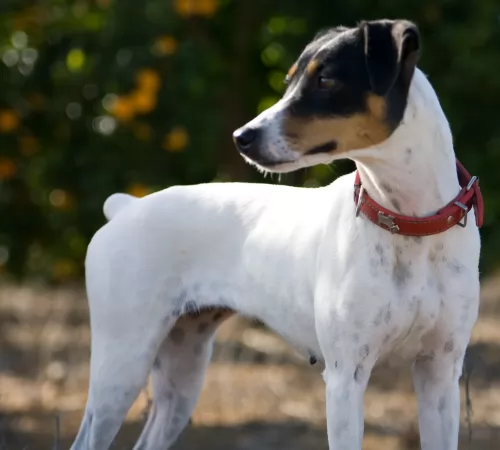 Long ago the English visited Spain to sample their wines, bringing with them smooth coated English Fox Terriers which were later crossed with other dog breeds of the area.
Long ago the English visited Spain to sample their wines, bringing with them smooth coated English Fox Terriers which were later crossed with other dog breeds of the area.
It is believed that the Andalusia Ratter’s ancestors were smooth coated fox terriers. The Club Nacional del Perro Andaluz Ratonero Bodeguero was established and in 1993 a standard for the breed was set.
It is only fairly recently that the breed was recognized by the Royal Canine Society of Spain but it isn’t recognized by any of the major kennel clubs.
 The Polish Hunting Dog is a large, strong dog standing between 50 – 66cm in height and weighing between 20 to 32kg. He is very similar to a Doberman Pinscher or a Rottweiler in looks.
The Polish Hunting Dog is a large, strong dog standing between 50 – 66cm in height and weighing between 20 to 32kg. He is very similar to a Doberman Pinscher or a Rottweiler in looks.
The dog’s coat is short and the color is usually black and tan. He is a deep chested dog with a well-proportioned head, with longish muzzle and floppy ears. The tail is long.
Well balanced and gentle, the Polish Hound is a courageous, intelligent dog, easy to train and socialize. It isn’t an aggressive dog but is wary of strangers.
He loves playing with children and is loving and kind to them. He never tires of their games. He is alert and protective and makes a great watchdog.
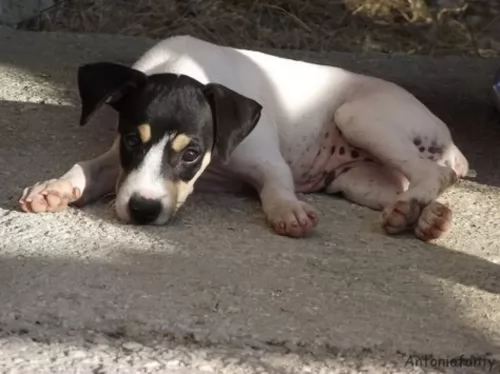 Also known as the Spanish Jack Russell, the Ratonero Bodeguero Andaluz looks very similar to this popular Jack Russell Terrier.
Also known as the Spanish Jack Russell, the Ratonero Bodeguero Andaluz looks very similar to this popular Jack Russell Terrier.
He is a small to medium sized dog with a lean, muscular body. The Ratonero developed in the south of Spain and is thought to be a mix of local ratting dogs and Fox Terriers. This ensured a quick, agile hunter.
The dog stands at between 35 – 43cm in height and weighs 6 - 9kg. The dog’s head is fairly small with dark brown eyes and half erect-half floppy ears. The coat is mainly white with some freckling. It is short and smooth with shades of black and tan covering the facial area. Some of these dogs are born with a natural bob-tail.
These dogs are known to have robust, hearty, happy personalities, full of the joys of living. They get on well with children as well as other pets if they have grown up with them.
Introductions should be slow if one of these dogs are brought into a home where there are already other pets. He is a very active breed and will be requiring plenty of mental stimulation and physical exercise.
They can provide quite a bit of entertainment for their human families as they can become quite clownish. They’re the kind of dogs that can adapt to life in the countryside or the city.
 Your Polish Hunting Dog is a great choice of dog as a family pet. Used as a hunting dog he will be thrilled if he lands up with a family who are active and outdoorsy types.
Your Polish Hunting Dog is a great choice of dog as a family pet. Used as a hunting dog he will be thrilled if he lands up with a family who are active and outdoorsy types.
You can always count him in when it comes to going for walks, hiking, cycling or running next to you when you go horse-riding.
The Polish Hunting dog is a stable, gentle dog and he has a whole lot of other wonderful attributes to his name. He is loving, loyal, courageous, friendly, social and companionable. And he's good looking. What a great pet this low maintenance dog makes.
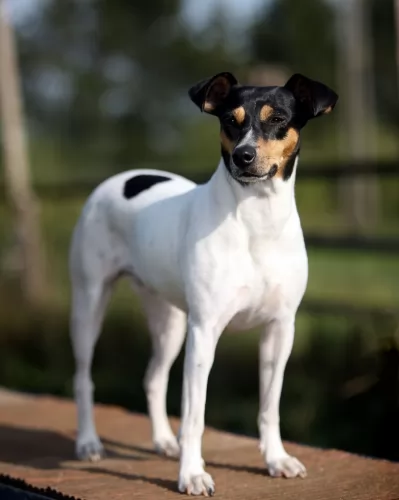 Your Ratonero Bodeguero Andaluz to this day is a ratter, always alert and ready to spring on prey. He is always lively and friendly, and with his loving nature, makes a splendid companion for his human family.
Your Ratonero Bodeguero Andaluz to this day is a ratter, always alert and ready to spring on prey. He is always lively and friendly, and with his loving nature, makes a splendid companion for his human family.
He is also a stubborn dog, liking to go his own way, and therefore will require training and socialization. He is an adaptable little dog too and when you bring him into your home he is willing to adapt to your way of life and become a loyal and loving member of your family.
 They are generally a robust breed and can easily reach up to 14 years of age with good care. There are always some common dog illnesses that you can benefit from knowing about because then you can get your pet to the vet if he appears to be under the weather.
They are generally a robust breed and can easily reach up to 14 years of age with good care. There are always some common dog illnesses that you can benefit from knowing about because then you can get your pet to the vet if he appears to be under the weather.
Active dogs are always going to be exposed to parasites, whether they be ticks, fleas or worms. Right from word go, puppies are treated for worms, but it is important to treat your dog regularly for parasites. Speak to your vet about the best products.
Heatstroke is always a risk for dogs even in areas where the weather isn’t particularly hot. People think on overcast days they can leave their dog in the car while they go in to the shops. A temperature that seems mild to a human can be like an oven to a dog. Excess heat is deadly to a dog. Signs of heatstroke include drooling, panting, anxiety, collapsing and then death.
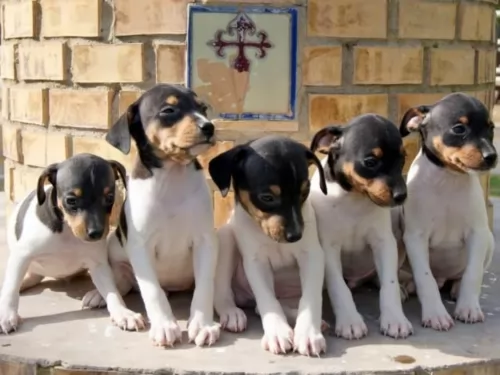 With good care, your Andalusian Ratter isn’t likely to get sick, but still, you would be better off knowing about some of the common dog diseases your pet could get.
With good care, your Andalusian Ratter isn’t likely to get sick, but still, you would be better off knowing about some of the common dog diseases your pet could get.
This is usually seen in young dogs where there is lameness in the hind legs and hip pain. It is believed that Legge Perthe’s occurs because of a genetic predisposition, and when it develops, there is sadly no cure.
Skin infections may seem fairly mild but nothing can be further from the truth. They can be painful and frustrating. Skin redness, dryness, itchiness and pain can cause your pet to lick and bite and make the situation worse. If your pet is being driven crazy by a skin irritation, get him to the vet who will do a complete physical examination.
Other diseases to be aware of include hip dysplasia, obesity, epilepsy and bloat.
 The Polish Hunting Dog has always had an acute sense of smell, and with his long legs he has always been able to track his prey for many miles. This hunting has made him a dog that wants lots exercise and activities.
The Polish Hunting Dog has always had an acute sense of smell, and with his long legs he has always been able to track his prey for many miles. This hunting has made him a dog that wants lots exercise and activities.
As a pet, this dog will require a lot of exercise, being better suited to active, outdoor type of owners. He is therefore better suited to life in the country and large open spaces as opposed to living in the city.
Apart from brushing your pets coat twice a week, check him over for ticks if you want to avoid the spread of tick-borne diseases.
Check his ears, inside and out. Check inside his mouth for bad teeth. This is because your dog can’t tell you if he has pain, and toothache can be terrible for your pet and bad teeth can affect other body organs such as the heart and the kidneys.
Make sure your pets nails are trimmed.
Make sure your pet receives excellent food. If you’re going to be feeding your dog commercially manufactured dog food, make sure it is the best quality ones. Some of the other foods have ingredients in them which can cause your dog to get sick.
Try and give your dog some wholesome, home-made food. Boiled chicken, brown rice or pasta, carrots, sweet potato and spinach chopped up and added to the kibble will have your pet wagging his tail with delight. It will also be to his benefit to get some raw meat in from time to time.
Never leave your pet without a constant supply of fresh, cool water.
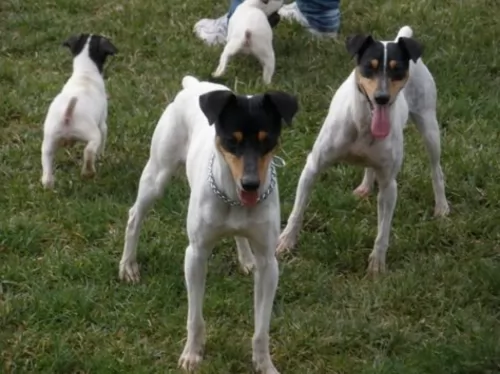 This is a fairly low maintenance dog as the short smooth coat will be easy to brush twice a week.
This is a fairly low maintenance dog as the short smooth coat will be easy to brush twice a week.
Check him over for unusual lumps, trim his nails and check inside his ears, look into his eyes to ensure they are bright and alert and look inside his mouth to make sure he doesn’t have any rotten teeth.
Have your pet neutered or spayed if you want to avoid puppies. This can be beneficial for your pet’s health too.
Feed your Ratonero Bodeguero Andaluz only the best food there is. If you opt for commercially manufactured food, make sure its full of vitamins and minerals. Your little pet will want consistency and simplicity with his food to avoid digestive problems.
Try and provide him with some home-made food which can be added to the dry kibble twice a week as a treat. Boiled chicken, brown rice or pasta and spinach, sweet potatoes and carrots all chopped up ad mixed into the dry kibble will ensure your pet’s health.
Some raw meat added in occasionally will also go towards ensuring his good health.
Always make sure he has access to fresh, cool water.
Provide him with a safe, dry, warm, comfortable place to sleep.
Get him to the vet when you see he is sick.
Ensure he has sun and shade in the garden.
Never ever leave him in a hot car.